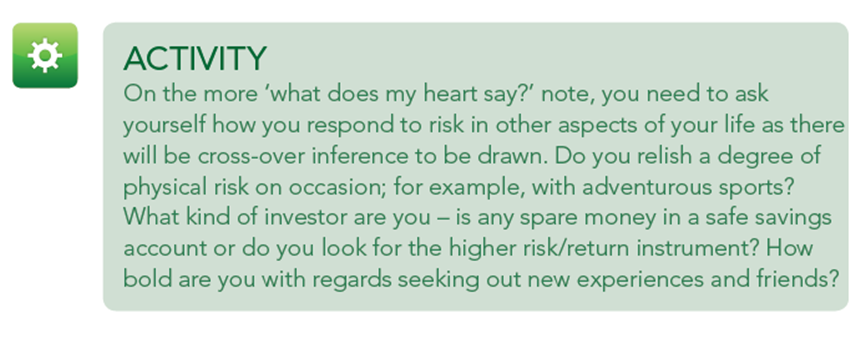An Entrepreneur’s ‘Attitude to Risk’
In last week’s blog, I completed my description of the ‘Complete Entrepreneur’. This was taken from my first guide Personal Motivation and Circumstance. This (free) guide seeks to explore, generally, the kinds of questions that would-be-entrepreneurs ask themselves. Of course, a fundamental aspect to such a self-evaluation is your personal attitude to risk. The autonomous, owner-manager path is not for everyone. So, this week, I want to dwell on this ‘Attitude to Risk’ question …
Entrepreneurism is fundamentally about taking a calculated risk with your time, talents and capital.
Risk, and the management thereof, is a pretty hackneyed term in current management literature. I want to take a more rounded look at it in the context of the journey you are seeking to embark on.
Of course, there is a very rational approach to this analysis – which you should undertake. There is also, however, a very gut-based aspect to this question – how do you feel about risk, what type of personality and demeanour do you have when it comes to facing risk? This is as important, if not more.
In relation to the former, you should – of course – spend time working up projected P&L and cash flow statements for your proposed venture (with accompanying poor/expected/good scenarios and sensitivity analysis). In most instances, this will generate a time value – how many weeks/months can I survive if my hypothesis concerning future sales does not arise? You will have a mortgage, liabilities and maybe even dependents so this quickly becomes a case of conjecturing a ‘line in the sand’ when you might have to – at worse case – concede defeat and look to return to the employee model.
So, do this calculation but then ask yourself what is really lost if it doesn’t work?
Clearly, the ‘safe brigade’ will say you have lost months of career continuity, you may even have fallen a few rungs down the career ladder at Big Firm plc as a result, you will likely have taken a confidence dent, you will certainly be poorer.
Let me say this also, however; even in the worst case, you will have gained some invaluable experience and – I believe – lifted yourself above the masses who never take such a leap. I would employ a failed entrepreneur – as someone who really demonstrated some ‘get up and go’ – every day over an employee-only journeyman with comparable technical skill sets.
The important thing here is that you don’t weight too punitively the cost of failure. You clearly don’t seek it – but just by stepping out into the world of self-employment you will have crossed a pretty special threshold that has some ‘personal brand differentiation’ and experiential value. I read some years ago about a study of US billionaires under the age of 30 – clearly quite a select group. One question posed to this set was ‘how many businesses did you start up and fold before you hit on the success you now have?’. The average – from memory – was 19! The US has a far more entrepreneur-encouraging regulatory environment and culture than other nations (it certainly does’t stigmatise failed directorship to the degree done in the UK for example). That national characteristic noted, you get the sense of what these individuals did just by stepping off into their first ventures.
So the rational risk analysis is important but you need to keep it in perspective.
If you find yourself naturally drawn to a risk-averse lifestyle and world view then this may not be the road for you. I strongly believe that with the advice this guide series lays out – intelligently applied with graft – you can eliminate a lot of the systematic risk involved in building a professional services business. That said, there are always external factors outside of your control. Indeed, the world outside your office window can be a capricious place at times, so you need to have a certain constitution for the unpredictability that lies ahead.
You should also factor in the ‘Important Others’ in your life (more of which in a subsequent extract). How will they fare – emotionally and practically – with the risk that you may well be sharing? Even if you are an emboldened risk taker, is it fair to take a nervous, dependent partner along for the ride? Only you can judge.
I should conclude this section with a final reinforcement of the point that this is more art, and gut, than calculator. The reason why is to do with the little-understood distinction between the concept of risk and uncertainty. Frank Knight, the distinguished economist famously elucidated on this in his seminal text Risk, Uncertainty and Profit (1921, Schaffner & Marx). ‘Knightian Risk’ is that which is computable with known probabilities (like the roulette wheel); ‘Knightian Uncertainty’ is that which you cannot measure or compute. As Nicholas Nassim Taleb expands on in his fantastic book, The Black Swan: The Impact of the Highly Improbable (2008, Penguin), the reality is that outside of a casino game, ‘computable’ risks are largely absent from real life. We do not, in all honesty, know the real odds we are betting on. As such, entrepreneurs are the most critical of catalysts for economies, as in the absence of perfect data they pioneer. They are required to be the non-rational agents who break the impasse, more artist than scientist, the kind of people that will take a bold leap and hope a net emerges to catch them.
In final analysis, to entrepreneur is to dare.




A broad subject well captured in a short, readable article.
Thanks Marcus … comment much appreciated.